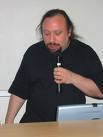I have from time to time visited the Bolivarian Republic of Venezuela. My most recent journey was at the formal invitation of their national government in relation to a letter I had sent to Hugo Chavez Frias in support of Russell Means and the Lakotah, who have withdrawn from treaty with the United States government and seek to end colonial occupation by formally re-establishing their full national sovereignty. It had been two years since I was last in Venezuela, and I thought it was worth noting what changes I had observed in the transformation of Venezuelan society.
While in the past my travels have ranged from Maturin to Maracaibo, this time, I was was entirely in Caracas. But given that 85% of Venezuelans had been driven out of the countryside (or urbanized), as lands mostly became held by large land-owners who actually found little interest in the routine aspects of farming, and in part because of a basic lack of infrastructure development, cities do remain the place to go in Venezuela to understand what the majority of the population experiences.
Of course, Caracas remains a work in progress, with constant construction. This was true two years ago, and remains true today. Some claim that this is petrol-socialism, using oil money to fund and put a publicly visible face on what some say somewhat unfairly is an otherwise ugly city. However, there are some changes both very real and far deeper than this, and sadly, some things that still do remain unchanged.
The first thing I noticed was the virtual absence of street vendors. What the government has done is create "free" people's markets, where they can setup shop off the street. While most are in tents in specially designated open spaces, they are currently constructing a large indoor multi-story public market. Think of it as a kind of "people's mall". The absence of street vendors however also makes it easier to see the other side of life in Caracas. There are however still people sleeping and living in the streets. This to me has not changed much, and is symptomatic of the larger challenges that still remain.
Some of course also aggressivily criticize these and other mistakes that have been made. But it is far too easy to criticize these failures while forgetting the very real and far more catastrophic social, political, and economic damage of the last century of exploitation which had left many Venezuelas living without electricity, and in the worst poverty in Latin America, while the wealthy exploited the vast oil wealth for themselves. Venezuela's past is a perfect example to consider, especially during the economic crisis in North America, what happens when rewarding only the sociopathic wealthy in a society while expecting their "economy" will somehow "help" the rest of the nation though trickledown, when instead the result is that they have tricked the population into enabling them to help themselves.
It is also easy to forget the very real successes Chavez's government has had, particularly in public education, in universal access to healthcare and housing, in poverty relief, and with honestly addressing the issues of the indigenous population. These are genuine changes and improvements that many ordinary Venezuelan's have directly experianced, though, as noted, not all have yet.
Actually, given all that has been done, the Venezuelan government still remains in many ways rather small. Many of the existing ministries have, in terms of size, changed very little even from before Chavez. This means the vast majority of the civil service even now remains pre-Chavez, and this too I am sure produces problems in implementing new programs. Many ministries sit in a single small office building. There is no vast spending on new and special buildings, even for the new "mission" ministries Chavez created, and certainly nothing like, for example, the grandiose HCFA campus the U.S. government built under Clinton in Maryland. It can be said that small government does limit what damage one can do with government, but it also limits what changes a government can make. This, as a practical limitation, even more so than desire, might be why Chavez chooses to purpose the role of the state as the "last rescuer", rather than as the transformer, of society.
Given this role of government, and the rather incremental approach to change, one wonders what happens in 2012. I have come to feel Chavez is in this sense a transitional figure. Given this, who can take over the presidency, and actually completes the transformation of society that Chavez has begun? Of all the people I have met or known over the years in Venezuela, there is to my mind only one person who I think can accomplish this, and actually do so rather successfully. That person is Nicolas Maduro. More on that another time.





